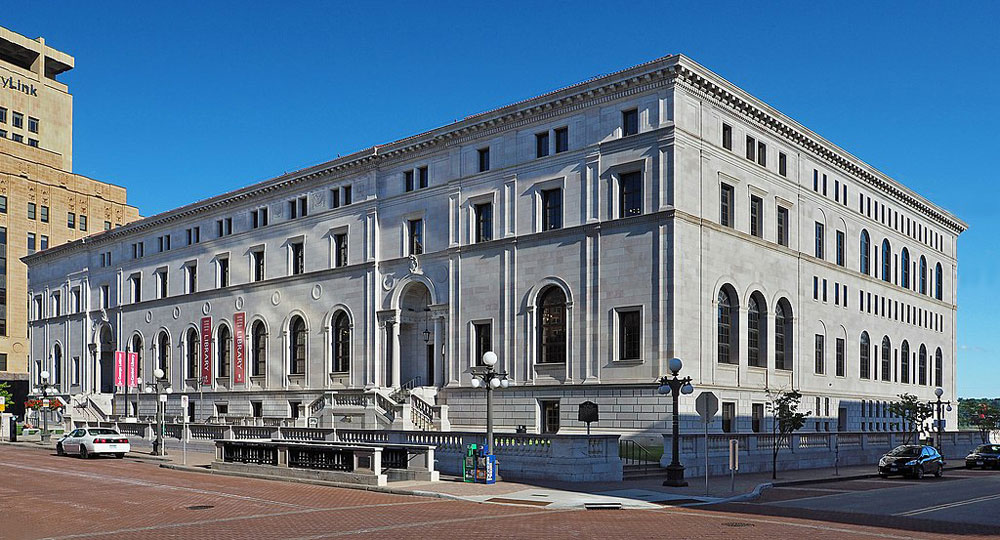
November 9, 2020; KSTP-TV
“As the pandemic continues, libraries are innovating,” reports Callan Gray for local Minneapolis television station KSTP. “Many have expanded their e-book catalogs, turned to curbside pickup, created Facebook story-time videos and expanded mobile hotspot rentals.” In doing so, Minnesota libraries are following a national trend. Back in August, NPQ’s Marian Conway offered similar stories of flexibility among libraries in New York state and Rhode Island.
At the Northtown Library in Blaine—located in Anoka County, just north of Minneapolis—the library implemented social distancing at the self-check-out stations and installed plexiglass around the main desk and computers. The county system saw about 7,000 new library card applications in the first three months of the pandemic.
The Great River Regional Library is a 32-library system providing services in six counties northwest of Minneapolis. It has similarly adjusted, according to executive director Karen Pundsack, who tells Gray that within weeks of shutdown, they shifted funds from their physical to digital resources (as well as cashed in a certificate of deposit to meet immediate funding needs), expanded access through the online library card registration, launched a grab-and-go service, and created computer appointments.
“We’re partnering with places like job service workforce development places so they can actually send people in here to fill out a résumé and complete a job application,” Pundsack explains.
“So many people don’t have the things they need to connect for school or working from home, so libraries help provide (and) fill in some of those gaps,” Stacey Hendren, president-elect of the Minnesota Library Association, tells Gray. Hendren adds “During the pandemic, [we’re] seeing a lot more people come in. Traditionally, if people lose their jobs, if there are different things going on with the economy, libraries get busier.”
Minnesotans famously love their libraries, and the value they are providing amid COVID-19 provides a good reminder why. But that love, alas, does not always result in adequate public funding.
“Many libraries had furloughs almost right away, working from home, shorter hours,” Hendren explains. “The furloughs were maintained, some furloughs have changed into layoffs, and so I have several friends who have lost jobs in libraries this year.”
Sign up for our free newsletters
Subscribe to NPQ's newsletters to have our top stories delivered directly to your inbox.
By signing up, you agree to our privacy policy and terms of use, and to receive messages from NPQ and our partners.
Hendren adds that libraries “across the state are facing budget constraints, budget worry. There’s a lot…unknown as we go into the end of the year.”
One place where funding is at risk is in the Minnesota capital city of Saint Paul, where the City Council is considering cutting $1.3 million dollars from its public library budget, which would result in 16 full-time positions, currently vacant, remaining unfilled.
The Friends of the Saint Paul Public Library are pushing back against the cuts, launching a campaign in October. In just over a week, more than 1,300 people signed a petition opposing the budget reduction, according to the organization’s president Beth Burns.
“The seriousness of these cuts means that Saint Paul Public Libraries will not be open on Sundays and many of these libraries won’t be open on Mondays,” Burns said. The Friends are seeking $450,000 in restored funding to help keep libraries open on Sundays and Mondays.
It would appear the Friends group may have some friends at City Hall, where councilmember Nelsie Yang expresses optimism that funding can be restored. “This is the moment when we actually do need to prioritize keeping our libraries open and that’s what I’m very clear about and what I have been sharing with folks,” says Yang, who adds that she is particularly concerned about ensuring marginalized, working-class and low-income communities have access to services.
Even if folks in Saint Paul get some funding restored, however, their library is not the only one at risk. “Public libraries, when the economy tanks are generally the busiest and it’s also when the budgets get tightest,” notes Pundsack.
Hendren adds that the state association is concerned about the long-term effects that the pandemic will have on libraries across the Gopher State.
“How long will it be before we can recover from a shrinking budget for this year?” she asks. “If we cut staff how long will it take to build that staff back up and support so we can support the community? We also support a lot of community partners… schools, homeless shelters, food shelves, businesses, and so we want to make sure we’re serving all of those.”—Steve Dubb













